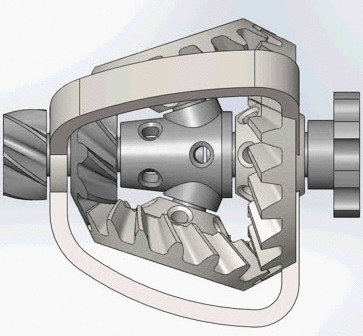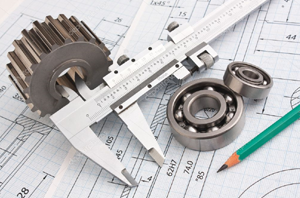Department of Mechanical Engineering Jalozai Campus
The knowledge of mechanical engineering is used to build useful products and devices for society. This can range from a device as small as a catheter injected into the human body, to a fax machine or printer, to a modern jet engine, to as large as a power plant for a major city.
Mechanical engineering encompasses the generation, conversion, transmission, and utilization of mechanical and thermal energy. This includes design, construction, and operation of all kinds of mechanical and thermal devices and systems. Of all the engineering offers the greatest breadh, flexibility and individuality. Indeed, Mechanical Engineering education is an ideal preparation for working and living in a technological world.
Mechanical engineering encompasses the generation, conversion, transmission, and utilization of mechanical and thermal energy. This includes design, construction, and operation of all kinds of mechanical and thermal devices and systems. Of all the engineering offers the greatest breadh, flexibility and individuality. Indeed, Mechanical Engineering education is an ideal preparation for working and living in a technological world.
UET Peshawar Vision
To be among the top-ranking universities of the world through education, research, and innovation.
UET Peshawar Mission
To produce highly qualified, well-rounded professionals through education who
play a leading role in the society by powering and driving knowledge-based
economy and offer research services and innovation for sustainable
development.
MED Jalozai Mission
To develop graduates with relevant skills through transfer of broad, and in-depth knowledge, enabling them to contribute towards solution of complexindustrial problems for sustainable development.
Program Educational Objectives
PEO 1 : Adopt challenging careers in the field of Mechanical Engineering with their professional competence for solution to engineering problems.
PEO 2 : Pursue advanced education, research, and development for achieving innovation in engineering and technology.
PEO 3 : Assume leadership position within an organization, in compliance with ethical, societal, economic, and environmental practices, for sustainable development.
- Department Program Learning Outcomes are:
- 1. Engineering Knowledge An ability to apply knowledge of mathematics, science, engineering fundamentals and an engineering specialization to the solution of complex engineering problems.
- 2. Problem Analysis An ability to identify, formulate, research literature, and analyze complex engineering problems reaching substantiated conclusions using first principles of mathematics, natural sciences and engineering sciences.
- 3. Design/Development of Solutions An ability to design solutions for complex engineering problems and design systems, components or processes that meet specified needs with appropriate consideration for public health and safety, cultural, societal, and environmental considerations.
- 4. Investigation An ability to investigate complex engineering problems in a methodical way including literature survey, design and conduct of experiments, analysis and interpretation of experimental data, and synthesis of information to derive valid conclusions.
- 5. Modern Tool Usage An ability to create, select and apply appropriate techniques, resources, and modern engineering and IT tools, including prediction and modeling, to complex engineering activities, with an understanding of the limitations.
- 6. The Engineer and Society An ability to apply reasoning informed by contextual knowledge to assess societal, health, safety, legal and cultural issues and the consequent responsibilities relevant to professional engineering practice and solution to complex engineering problems.
- 7. Environment & Sustainability An ability to understand the impact of professional engineering solutions in societal and environmental contexts and demonstrate knowledge of and need for sustainable development.
- 8. Ethics Apply ethical principles and commit to professional ethics and responsibilities and norms of engineering practice.
- 9. Individual and Team Work An ability to work effectively, as an individual or in a team, on multifaceted and /or multidisciplinary settings.
- 10. Communication An ability to communicate effectively, orally as well as in writing, on complex engineering activities with the engineering community and with society at large, such as being able to comprehend and write effective reports and design documentation, make effective presentations, and give and receive clear instructions.
- 11. Project Management An ability to demonstrate management skills and apply engineering principles to one's own work, as a member and/or leader in a team, to manage projects in a multidisciplinary environment.
- 12. Lifelong Learning An ability to recognize importance of, and pursue lifelong learning in the broader context of innovation and technological developments.
- Academic Programs
- - B.Sc. Mechanical Engineering
Syllabus of Mechanical Engineering
Industrial Visits
Industrial visits are regularly conducted every year to broaden the horizon of students and to appraise them with the industry of Pakistan.
- Laboratories Practical work in laboratories is an essential part of the curriculum. Almost all subjects taught are augmented by practicals in the laboratories. The Department is supported by well-equipped laboratories having state-of-the-art machinery and equipment. It has the following laboratories:
- - Stress Analysis Lab.
- - Hydraulics and Fluid Mechanics Lab.
- - Production Automation Lab.
- - Power Plant Lab.
- - Diesel Engine Simulation Lab.
- - Metallurgy Laboratory
- - Automotive A/C System Lab.
- - Modular Fluid Power Lab.
- - Fluid Power Learning Lab.
- - Hydraulics & amp; Pneumatics Lab
- - Automotive Troubleshooting Lab


